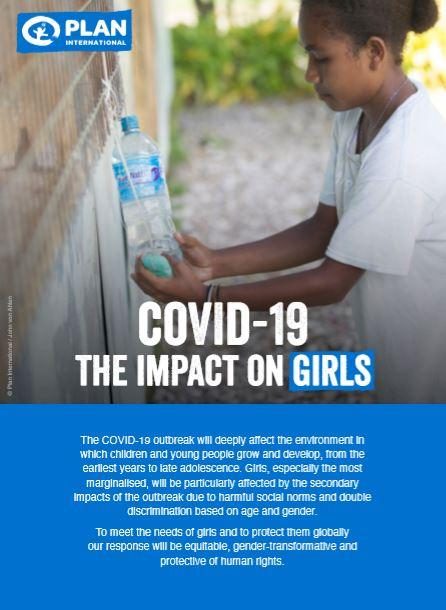COVID-19: The Impact on Girls
23 April 2020
The COVID-19 outbreak will deeply affect the environment in which children and young people grow and develop, from the earliest years to late adolescence.
Girls, especially the most marginalised, will be particularly affected by the secondary impacts of the outbreak due to harmful social norms and double discrimination based on age and gender. To meet the needs of girls and to protect them globally our response will be equitable, gender-transformative and protective of human rights.
The reality facing girls
Today the world is home to some 1.2 billion girls, of whom 600 million are adolescents – they will suffer particular disadvantages due their gender and age, which is compounded by poverty and other discriminatory factors, such as disability or ethnicity. Often, they enter adulthood already at a severe disadvantage as a result of violence, early pregnancy, child marriage and limited opportunities for education and employment.
COVID-19 shutdowns will disrupt early learning, formal education and livelihoods. The lives of girls, their families and communities face extreme stress from health and economic burdens, crowding and isolation. Measures to curb the disease have worsened existing inequalities, forcing girls out of school and placing them at heightened risk of violence in their home. With school and university closures affecting nearly 91% of the world’s student population, over 1.5 billion learners have had their education disrupted, including 743 million girls. Nor can girls equally access online learning. Boys are 1.5 times more likely to own a phone than girls in low and middle-income countries and are 1.8 times more likely to own a smartphone that can access the internet.
When girls are out of school they struggle to access social support structures and essential services such as sexual and reproductive health services. We have seen a global increase in domestic violence that is being described as the ‘second pandemic’. Economic downturns, job losses and school closures will increase sexual violence, exploitation, trafficking, child labour and harmful practices. Girls face an unequal burden of unpaid care and domestic work, which will increase as they are kept at home.
Plan International knows from past crises the long-term indirect impacts facing vulnerable children and young people. Girls living in the least developed countries, or fragile, conflict or disaster affected contexts, where healthcare systems are usually weak and will quickly become overwhelmed, are acutely vulnerable to a diversion of resources away from other key medical services.
Download options
Influencing Brief
0.00 b
Categories: Emergencies


